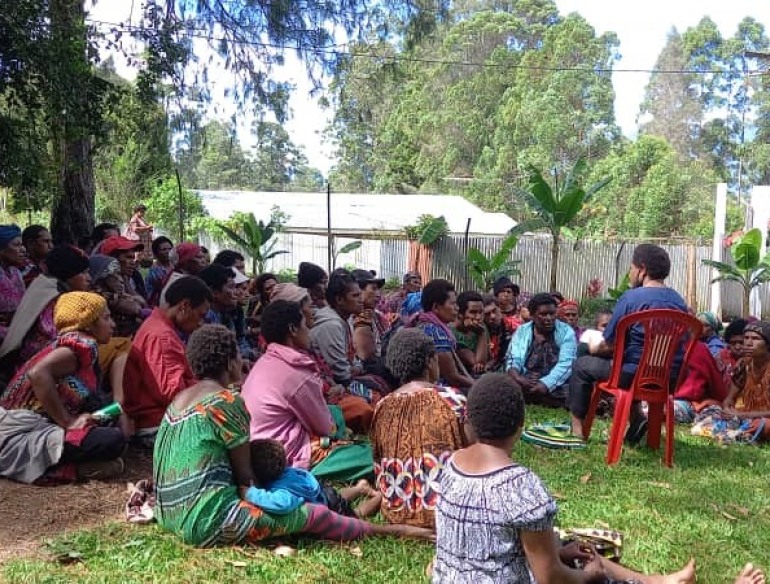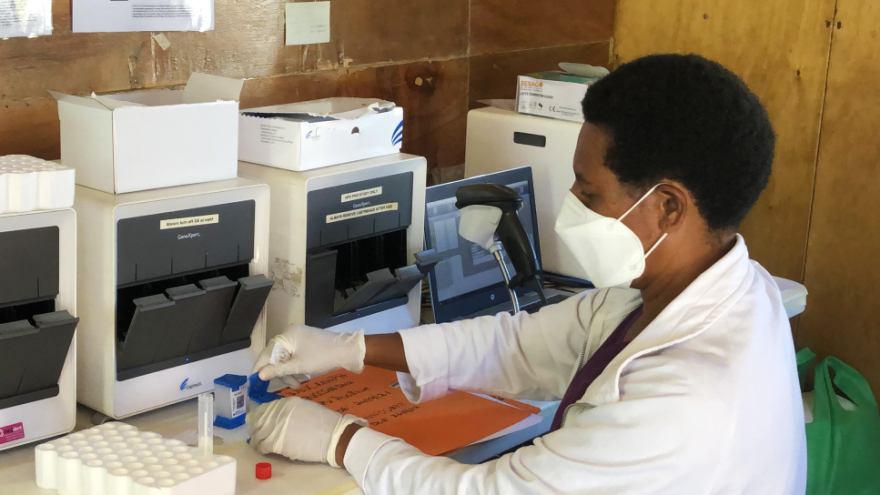A landmark initiative to eliminate cervical cancer in the Western Pacific officially launched in Papua New Guinea.
Thousands of women in Papua New Guinea’s Western Highlands Province are the first to benefit from an initiative to eliminate cervical cancer in the Western Pacific, with tens of thousands more women and girls set to be screened, treated, and vaccinated in the next two years.
Under the initiative so far, more than 2,500 PNG women have been screened for HPV, or human papillomavirus, which causes almost all cervical cancers, and 431 women have received same-day treatment or been referred for specialist medical care for cervical pre-cancer or cancer.
At Mt Hagen Provincial Hospital today, leaders from Western Highlands Provincial Health Authority (WHPHA) launched an initiative with the long-term potential to save 150,000 lives in a nation which suffers among the highest global burden of cervical cancer, with death rates from the disease 12 times higher than those in Australia.
“Women in Papua New Guinea have waited decades for cervical screening programs that are highly effective, easily accessible, and can provide testing and treatment on the same day," said Gloria Munnull, nurse in charge at Mt Hagen’s Well Woman Clinic, the central hub for cervical cancer screening in the province.
Papua New Guinea women's clinic
“That day has now arrived and we are thrilled to be at the forefront of this revolution in cervical screening, here in Western Highlands.”
Eliminating Cervical Cancer in the Western Pacific (ECCWP) is a partnership between the Western Highlands Provincial Health Authority in collaboration with C4 partners: the Daffodil Centre (a joint venture between Cancer Council NSW and The University of Sydney), the Kirby Institute UNSW Sydney, the Australian Centre for Cervical Cancer Prevention, and Family Planning NSW. It is backed by an $8-million investment from Minderoo Foundation's Collaborate Against Cancer initiative, with $1.6-million provided to support activities in Western Highlands Province, in addition to donations of vaccines, equipment and consumables.
“In Papua New Guinea, women are the pillars of the nuclear and extended family. The loss of women still in their young and productive years results in suffering for whole families lasting more than one generation,” said Dr Paulus Ripa, Head of clinical services at Western Highlands Provincial Health Authority, who is leading the program in the province.
“We aim to screen more than 14,000 women by the end of 2023 and a total of 30,000 women by June 2025, representing 70 per cent of all age-eligible women in Western Highlands Province. Early next year, WHPHA will also start offering HPV vaccination to girls and by June 2025 aim to have vaccinated 30,000 girls aged 9-14-years in – 90% of the age-eligible population in our province,” he said.
Aligning with the World Health Organization’s strategy to eliminate cervical cancer worldwide by 2030, the ECCWP initiative also operates in neighbouring Vanuatu, where a total of 30,000 Ni-Vanuatu women are also expected to be screened for HPV, and 30,000 girls vaccinated against HPV infection by June 2025, in partnership with the Vanuatu Ministry of Health.
“Screening and treatment form two critical components of the WHO Global Elimination Strategy and are at the heart of our initiative and the support we are providing to PNG and Vanuatu,” said Professor Andrew Vallely, Head of Global Reproductive Health at the Kirby Institute, UNSW (a C4 partner) and one of the joint leaders of the elimination program in the Western Pacific.
“We hope that the success of the ECCWP program in the Western Highlands of PNG and across Vanuatu will pave the way for similar programs to be implemented in other Western Pacific nations that suffer from similarly high rates of cervical cancer, and where we know that early diagnosis and treatment can be lifesaving, as here in PNG,” he said.
The initiative joins forces with major complementary investments by diagnostic biotechnology company, Cepheid, the Frazer Family Foundation, and the Asia Development Bank, with in-kind contributions from the governments of PNG and Vanuatu, to obtain HPV vaccines, deliver HPV testing and build health system capacity.
Professor Claire Wakefield, Director of Minderoo Foundation’s Collaborate Against Cancer initiative, said the initiative showcases the power of collaboration between philanthropy, national and provincial health authorities, academic research institutes, medical societies and expert groups working with local healthcare workers.
“Most importantly, this landmark initiative builds hope and gives PNG women improved awareness of, and access to, HPV screening, which will go a long way to helping them to live long and healthy lives in the families and communities that love them.”
About Western Highlands Provincial Health Authority
The Western Highlands Provincial Health Authority was established in March 2011, amalgamating Mt Hagen General Hospital and the Provincial Division of Health Services to have one health system to deliver effective health services to the people of Western Highlands.
The Western Highlands Province has a total of 38 health facilities including one provincial hospital (Mt Hagen), three district hospitals (Tinsley, Kotna and Tambul), health centres, health sub-centres and Community Health Posts.
Its mission is to engage all stakeholders, provide leadership in understanding health and making health a way of life and thereby provide safe, efficient, effective and appropriate health service for all people of the Western Highlands.
About C4
C4 unites Australia’s leaders in cervical cancer control, in both HPV vaccination and cervical screening, with researchers from the Daffodil Centre (a joint venture between Cancer Council NSW and The University of Sydney), the Australian Centre for the Prevention of Cervical Cancer, Kirby Institute at UNSW Sydney, and the University of Melbourne.
The work of C4 investigators has underpinned Australia’s major innovations in public health in terms of the successful delivery of HPV vaccination in girls and boys and the implementation of an HPV-based cervical screening program.
https://www.cervicalcancercontrol.org.au/
About Minderoo Foundation
Established by Andrew and Nicola Forrest in 2001, Minderoo Foundation is a modern philanthropic organisation seeking to break down barriers, and drive positive, lasting change. Minderoo Foundation is proudly Australian, with more than $2.7 billion committed to a range of global initiatives, spanning from ocean research and ending modern slavery, to collaboration against cancer and community projects. Our mission is to arrest unfairness and create opportunities to better the world.
https://www.minderoo.org/collaborate-against-cancer/#overview
Media contact
Lucienne Bamford, Communications Manager
+61 431 894 029, lbamford@kirby.unsw.edu.au

